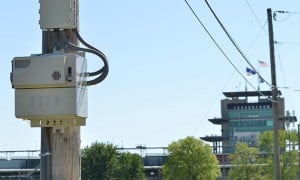
At the Medford Town Council meeting on Tuesday, Dec. 6, a representative of Verizon Wireless was present to request council grant the company access to the township right-of-way to extend coverage without having to install a new cell phone tower. A draft resolution was also presented in the case council chose to move forward.
“A representative came in, and they are looking to install [nodes] on telephone poles that enhance their signal,” Township Manager Kathy Burger said. “They have to access the right-of-way to do this, so they are going to all municipalities that are affected and asking basically for permission, and that is done via this draft resolution.”
Burger said Verizon has said if council would like any changes to the resolution, they could be made to the draft resolution and sent back to Verizon. The wireless phone services company would then work with the township to ensure the changes could be accommodated.
“So the approval that they’re looking for is a general approval,” Mayor Jeffrey Beenstock said. “I think I read in the materials that they would then come back to us for specific approvals. They’re just looking for a general grant [at this point].”
Verizon identified the township in its agreement, and made note it would additionally need to get approvals from all involved third parties. At the time, Verizon is only requesting permission to use the right-of-way, however, Councilman Brad Dunn suggested restrictions on the right-of-way to ensure there are regulations on setbacks from residences.
“There’s people that turn off their Wi-Fi at night because they’re freaked out about it being in their house, and we’re potentially getting ready to put an antenna 10 feet from someone’s bedroom window. I’m not sure we shouldn’t put some type of a setback restriction on where they are,” Dunn said.
He said in most places, an antenna would probably be fine, but not in the case of residences on Main and Branch streets. Here, he believed the antennas could wind up being too close to where someone is sleeping, causing possible concern.
Burger said she could try to get a list of possible locations from Verizon and list it again on the agenda for the next meeting. Then, she requested Bill Flanagan of Tilson Technology Co., who is representing Verizon Wireless on this project, come to the podium to speak on the project.
“This is part of an overall project for the entire state of New Jersey,” Tilson said. “Now we’re working in Southern New Jersey just over the last month, and we’re reaching out to most municipalities asking for consent to operate within the right-of-way. They have not yet determined where these nodes will be.”
He explained this is an ongoing process, one that he expects to be in place over the next couple of years for South Jersey. The company uses radio frequency studies to look for areas that lack coverage and that there is higher demand for data transmission, determining where it would like to locate the nodes.
Tilson ensured the municipality it would have the chance to look over the locations before anything was approved. However, because it was expressed there is no need for council to move quickly with this request, it was agreed to table the discussion for the consent agenda for the meeting scheduled on Tuesday, Dec. 20, when a Verizon construction official was ideally able to have provided council with more information on appropriate setbacks.
“We’re going to look into the nodes further and see if administratively or through council if we can address the issue,” Beenstock said. “Through the materials that were given and by what the representative said at the meeting, it seems that whatever is transmitted through the nodes will have a low impact.”









